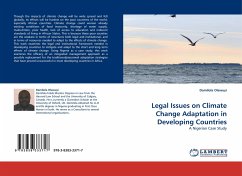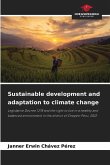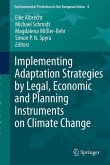Though the impacts of climate change will be wide spread and felt globally, its effects will be hardest on the poor countries of the world, especially African countries. Climate change could worsen already existing conditions of food insecurity, shortage of water supply, malnutrition, poor health, lack of access to education and indecent standards of living in African States. This is because these poor societies are the weakest in terms of structures both legal and institutional, and in terms of resources needed to adapt to the effects of climate change. This work examines the legal and institutional framework needed in developing countries to mitigate and adapt to the short and long term effects of climate change. Using Nigeria as a case study, this work examines the efficacy of an integrated management approach as a possible replacement for the traditional/piecemeal adaptation strategies that have proved unsuccessful in most developing countries in Africa.
Bitte wählen Sie Ihr Anliegen aus.
Rechnungen
Retourenschein anfordern
Bestellstatus
Storno








